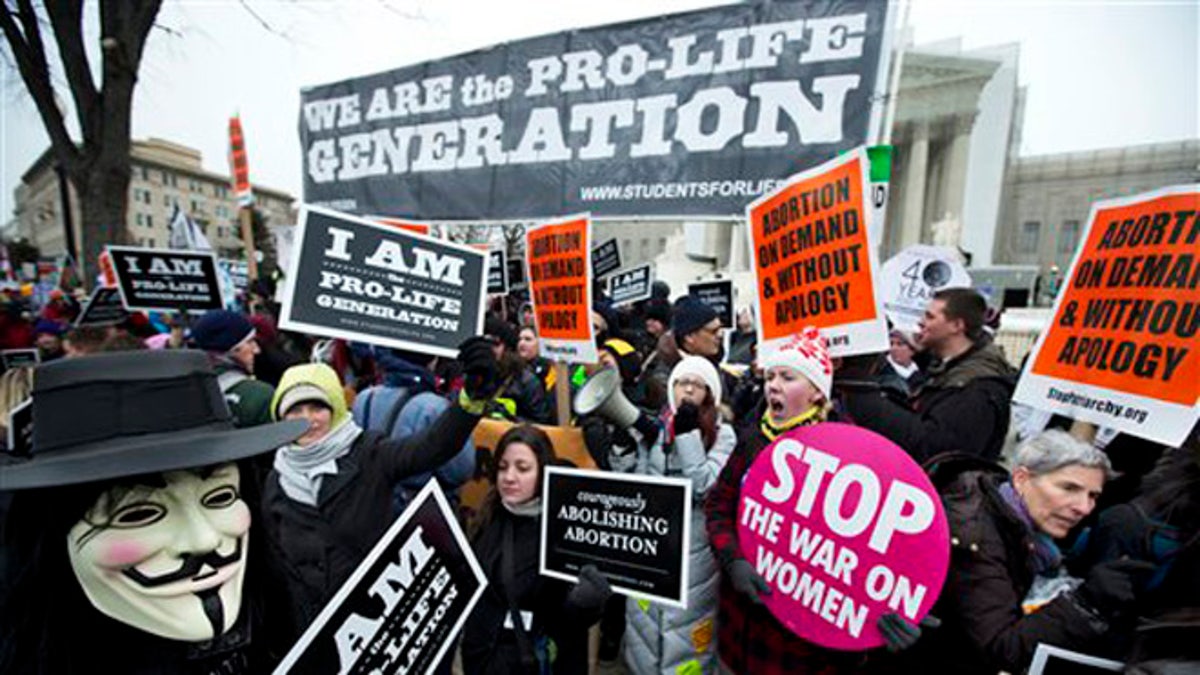
Pro-abortion rights activists, rally face-to-face against anti-abortion demonstrators as both march in front of the U.S. Supreme Court in Washington, Friday, Jan. 25, 2013, in a demonstration that coincides with the 40th anniversary of the Roe vs. Wade decision that legalized abortion. (AP Photo/Manuel Balce Ceneta)
Undaunted by bitterly cold temperatures and a forecast for snow, pro-life marchers came to Washington for the March for Life -- as they have for four decades -- determined, they say, to instill a culture of life in a nation that has seen 55 million abortions since the landmark Roe v. Wade decision.
The National Park Service no longer does crowd size estimates, but organizers believed the crowd Friday to be considerably larger than last year's 400,000 people.
The list of speakers was pared down from years past with some legislators, House Speaker John Boehner among them, offering video-taped remarks to the shivering crowd.
Among the speakers at the rally was Rick Santorum, the former Pennsylvania senator and staunch abortion opponent who last year unsuccessfully sought the Republican presidential nomination.
He recalled the love and support the country showed for his young daughter, Bella, who was born with a serious genetic condition and whose illness led him to take some time off from the campaign trail. He cited his daughter's life -- "she is joyful, she is sweet, she is all about love" -- as a reason to discourage abortion even in instances when women are told that it would be "better" for their unborn children to have one.
"We all know that death is never better -- never better. Really what it's about is saying is it would be easier for us, not better for her," he said. "And I'm here to tell you ... Bella is better for us and we are better because of Bella."
He said the pro-life cause was made up of people who every day advocate for their position outside abortion clinics and at crisis pregnancy centers.
"This movement is not a bunch of moralizers standing on their mountaintop preaching what is right," Santorum said.
Sen. Rand Paul, R-Ky., spoke in person and received a chorus of, "No!" when he asked the crowd, "Can a nation long endure that does not respect sanctity of life?"
The pro-choice Guttmacher Institute found that four in 10 unintended pregnancies in the U.S. end in abortion. One third of American women will have an abortion by age 45. While the procedure is decreasing overall, it's up 18 percent among poor women.
Pro-life marchers are fearful that those numbers may rise given the national election results that put a staunch pro-choice president back in office.
"Certainly I am disappointed in the election," Father Mike Orsi of the Ave Maria School of Law told Fox News.
Adding to their election year woes: controversial remarks by pro-life Senate candidates Todd Akin of Missouri and Richard Mourdock of Indiana helped doom the GOP hopes of reclaiming the Senate. The two men's sinking poll numbers late last year paralleled a flip-flop in a recent Gallup poll -- now showing 48 percent of Americans are pro-choice and 44 percent are pro-life.
Still, November's losses in Washington were tempered by gains at the state level. "In the states we got 33 pro-life governors. We got a lot of pro life legislators. We're going to make great, great progress in the states," Father Frank Pavone of Priests for Life said.
Pro- life leaders are also buoyed by the role science is playing in affirming their view that life begins at conception.
"The status of the unborn child is increasing," Pavone said. "Medical science acknowledges the child as our newest patient. Fetal therapy, fetal diagnosis, and surgery -- no question -- and laws are beginning on the state level to recognize the unborn as a real person, as a real victim."
As the marchers trekked up Constitution Avenue toward the Supreme Court, some were met by a small counter-demonstration organized by Stop Patriarchy dot Org, a group devoted to "ending pornography and the degradation of women," according to its website. There were no apparent scuffles or shouting matches. At one point, pro-life demonstrators mingled with the counter demonstrators, using a bull horn to chant, "We are the pro life generation." Counter-protestors stood silently by.
March for Life organizers have often complained about the event's lack of positive coverage in the mainstream media. Those complaints have been somewhat muted, as organizers draw upon social media to get their message out.
"We have the biggest social media movement online for the pro life movement educating almost a million people a week with the truth about human life and abortion," Lila Rose of Action Network, a pro-life investigative journalism group, told Fox News. "Our Facebook at over 430,000 is bigger than Planned Parenthood's Facebook and they're a billion dollar abortion chain."
One pro-life organizer said that their role, given diminished power in Washington, will be to block pro-choice initiatives for the next four years, while building a new foundation through enthusiastic young supporters, and keeping pro-life politicians on a tight message.
"We've got to do a better job of teaching our public officials how to speak about this issue," Pavone said.
The March for Life’s large turnout reflected the ongoing relevance of the abortion debate four decades after the decision.
It remains a divisive issue with no dramatic shift in viewpoint on either side; a new Pew Research Center poll finds 63 percent of U.S. adults opposed to overturning Roe, compared to 60 percent in 1992. Earlier this week, abortion opponents marked the anniversary with workshops, prayers and calls for more limits on abortion rights. And even as Obama this week reaffirmed his commitment to "reproductive freedom," state legislatures continue to consider varied restrictions on a woman's ability to receive an abortion.
The Associated Press contributed to this report.




